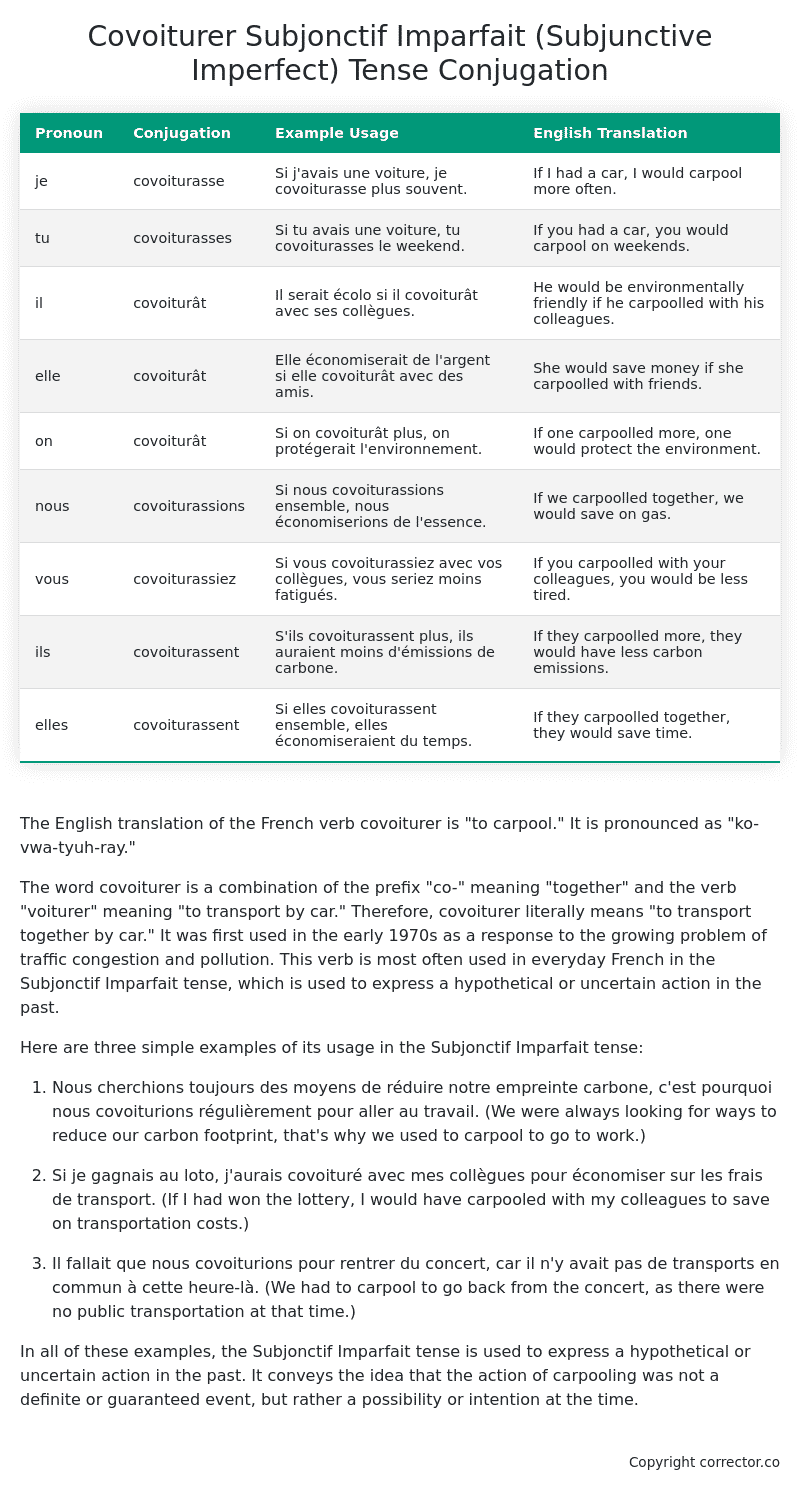Subjonctif Imparfait (Subjunctive Imperfect) Tense Conjugation of the French Verb covoiturer
Introduction to the verb covoiturer
The English translation of the French verb covoiturer is “to carpool.” It is pronounced as “ko-vwa-tyuh-ray.”
The word covoiturer is a combination of the prefix “co-” meaning “together” and the verb “voiturer” meaning “to transport by car.” Therefore, covoiturer literally means “to transport together by car.” It was first used in the early 1970s as a response to the growing problem of traffic congestion and pollution. This verb is most often used in everyday French in the Subjonctif Imparfait tense, which is used to express a hypothetical or uncertain action in the past.
Here are three simple examples of its usage in the Subjonctif Imparfait tense:
-
Nous cherchions toujours des moyens de réduire notre empreinte carbone, c’est pourquoi nous covoiturions régulièrement pour aller au travail. (We were always looking for ways to reduce our carbon footprint, that’s why we used to carpool to go to work.)
-
Si je gagnais au loto, j’aurais covoituré avec mes collègues pour économiser sur les frais de transport. (If I had won the lottery, I would have carpooled with my colleagues to save on transportation costs.)
-
Il fallait que nous covoiturions pour rentrer du concert, car il n’y avait pas de transports en commun à cette heure-là. (We had to carpool to go back from the concert, as there were no public transportation at that time.)
In all of these examples, the Subjonctif Imparfait tense is used to express a hypothetical or uncertain action in the past. It conveys the idea that the action of carpooling was not a definite or guaranteed event, but rather a possibility or intention at the time.
Table of the Subjonctif Imparfait (Subjunctive Imperfect) Tense Conjugation of covoiturer
| Pronoun | Conjugation | Example Usage | English Translation |
|---|---|---|---|
| je | covoiturasse | Si j’avais une voiture, je covoiturasse plus souvent. | If I had a car, I would carpool more often. |
| tu | covoiturasses | Si tu avais une voiture, tu covoiturasses le weekend. | If you had a car, you would carpool on weekends. |
| il | covoiturât | Il serait écolo si il covoiturât avec ses collègues. | He would be environmentally friendly if he carpoolled with his colleagues. |
| elle | covoiturât | Elle économiserait de l’argent si elle covoiturât avec des amis. | She would save money if she carpoolled with friends. |
| on | covoiturât | Si on covoiturât plus, on protégerait l’environnement. | If one carpoolled more, one would protect the environment. |
| nous | covoiturassions | Si nous covoiturassions ensemble, nous économiserions de l’essence. | If we carpoolled together, we would save on gas. |
| vous | covoiturassiez | Si vous covoiturassiez avec vos collègues, vous seriez moins fatigués. | If you carpoolled with your colleagues, you would be less tired. |
| ils | covoiturassent | S’ils covoiturassent plus, ils auraient moins d’émissions de carbone. | If they carpoolled more, they would have less carbon emissions. |
| elles | covoiturassent | Si elles covoiturassent ensemble, elles économiseraient du temps. | If they carpoolled together, they would save time. |
Other Conjugations for Covoiturer.
Le Present (Present Tense) Conjugation of the French Verb covoiturer
Imparfait (Imperfect) Tense Conjugation of the French Verb covoiturer
Passé Simple (Simple Past) Tense Conjugation of the French Verb covoiturer
Passé Composé (Present Perfect) Tense Conjugation of the French Verb covoiturer
Futur Simple (Simple Future) Tense Conjugation of the French Verb covoiturer
Futur Proche (Near Future) Tense Conjugation of the French Verb covoiturer
Plus-que-parfait (Pluperfect) Tense Conjugation of the French Verb covoiturer
Passé Antérieur (Past Anterior) Tense Conjugation of the French Verb covoiturer
Futur Antérieur (Future Anterior) Tense Conjugation of the French Verb covoiturer
Subjonctif Présent (Subjunctive Present) Tense Conjugation of the French Verb covoiturer
Subjonctif Passé (Subjunctive Past) Tense Conjugation of the French Verb covoiturer
Subjonctif Imparfait (Subjunctive Imperfect) Tense Conjugation of the French Verb covoiturer (this article)
Subjonctif Plus-que-parfait (Subjunctive Pluperfect) Tense Conjugation of the French Verb covoiturer
Conditionnel Présent (Conditional Present) Tense Conjugation of the French Verb covoiturer
Conditionnel Passé (Conditional Past) Tense Conjugation of the French Verb covoiturer
L’impératif Présent (Imperative Present) Tense Conjugation of the French Verb covoiturer
L’infinitif Présent (Infinitive Present) Tense Conjugation of the French Verb covoiturer
Struggling with French verbs or the language in general? Why not use our free French Grammar Checker – no registration required!
Get a FREE Download Study Sheet of this Conjugation 🔥
Simply right click the image below, click “save image” and get your free reference for the covoiturer Subjonctif Imparfait tense conjugation!

Covoiturer – About the French Subjonctif Imparfait (Subjunctive Imperfect) Tense
Formation
Common Everyday Usage Patterns
Interactions with Other Tenses
Subjonctif Présent
Indicatif Passé Composé
Conditional
Conditional Perfect
Summary
I hope you enjoyed this article on the verb covoiturer. Still in a learning mood? Check out another TOTALLY random French verb conjugation!


